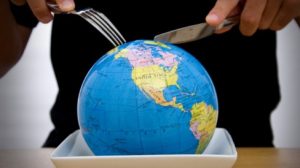Throughout human history international trade has driven cultural exchange and (often) economic development. The expansion of global trade over the last half century has brought more diverse, abundant, and affordable food to our shelves. For these reasons, we value the contribution trade has made to our societies. However, whilst we reap benefits, the costs to our planet and vulnerable populations across the globe can be devastating and remains often out of sight.

Trade that is good for people and planet
Nourish wants trade that is fair, that supports local communities, that looks after the health of our planet. Our definition of ‘short supply chains’ (borrowed from the EIP-Agri Short Food Supply Chains Focus Group) is not geographical, but relational:
‘a supply chain involving a limited number of economic operators, committed to co-operation, local economic development, and close geographical and social relations between producers, processors and consumers’
In other words, a short supply chain might mean getting a veg box from your nearest farm or buying fair trade rice directly from a women’s cooperative in Malawi. We believe that more localised food systems combined with a global trade system involving more cooperatives and direct relationships with producers, can ensure that everyone earns a fair reward for their labour producing food in an ecologically sensitive and socially just way.
The Environmental Cost of Global Trade
With the growth in trade and increasing focus on producing food for export, the way food is produced has shifted significantly. Deforestation and monocultures are common features of a system that is focussed on producing more food as cheaply as possible. This has undermined the environment, resulting in the loss of natural habitats, resource-intensive production methods, and ever-increasing global transport emissions.
In 2008 in the UK we imported 48% of our food supply, compared to 36% in 1987[1]. The land and resources to feed the British population are increasingly coming from abroad: we are effectively outsourcing the environmental impact of our diet.
The Human Cost
As the volume of traded goods grew exponentially over the last decades, food chains have become longer, more obscure, and in many cases more unjust. People have lost touch with local and seasonal food. Small farmers, at home and abroad, are faced with tough competition from imports of cheap food from distant monocultures, and are often faced with little choice than to sell their crops for a low price to multi-national corporations.
With the increasingly complex supply chains there is less oversight of who is producing and processing our food. There have been several reports of slave-labour conditions in chains supplying British supermarkets. The horse meat scandal of 2014 was an indication that we’re not only ignorant of the harm going into producing food, but also of what goes into the food altogether.
Food production has become focused on exports, while significant portions of national populations are still going hungry. This is true for the global North as well as the South, and certainly for Scotland too.
Trade deals
These costs are only increasing as countries negotiate massive free trade deals that include more and more goods and services. Talks on trade of agricultural products in the WTO (World Trade Organisation) stalked in the early 2000s. As a consequence, countries started making bilateral or regional trade deals that include food. In the European Union, the European Commission negotiates trade deals on behalf of the EU Member States. Currently, two famous trade deals are being negotiated: CETA and TTIP, respectively the “Comprehensive Economic and Trade Agreement” between Canada and the EU and the “Trans-Atlantic Trade and Investment Partnership” between the USA and the EU.
Learn more
If you would like to know more about trade deals and what the stakes are for our food and farming, have a look at these resources:
- Arc2020 regularly post articles about TTIP and CETA, in relation to food and farming
- BuzzFeed published a very good series of four articles about the toxic ISDS, the Investor-State Dispute Settlement
Get involved
Are you compelled to get involved? Nourish does not campaign on trade deals, but some of our friends do:
- War on Want oppose CETA and TTIP, and recently published a report about the threat CETA poses to UK food safety.
- Global Justice Now campaign actively against ‘toxic trade deals‘, more information about their work and how to get involved on their website.
[1] http://rsif.royalsocietypublishing.org/content/royinterface/13/114/20151001.full.pdf?ijkey=OzaOlLz1rfgC0dn&keytype=ref